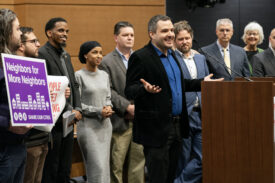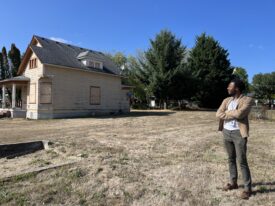 Wouldn’t it be nice to be enclosed in an impenetrable bubble eight feet in every direction? Nothing could get in the bubble without your express permission—and anyone who violated the bubble would be in trouble with the law. Sound far fetched? Not really. Just check out the growing debate in Northwest cities like Seattle, Spokane, and Portland about panhandling and you’ll see that some local elected officials and newspapers want to blow up that kind of bubble for urban dwellers to protect them from panhandling. A bubble might seem safe and like a good idea, but one writer has outlined some compelling reasons why this approach has some serious downsides to creating livable compact communities.
Wouldn’t it be nice to be enclosed in an impenetrable bubble eight feet in every direction? Nothing could get in the bubble without your express permission—and anyone who violated the bubble would be in trouble with the law. Sound far fetched? Not really. Just check out the growing debate in Northwest cities like Seattle, Spokane, and Portland about panhandling and you’ll see that some local elected officials and newspapers want to blow up that kind of bubble for urban dwellers to protect them from panhandling. A bubble might seem safe and like a good idea, but one writer has outlined some compelling reasons why this approach has some serious downsides to creating livable compact communities.
Writer Don Mitchell in a brilliantly titled article “The S.U.V. Model of Citizenship: Floating Bubbles, Buffer Zones, and the Rise of the ‘Purely Atomic’ Individual” tracks the idea of the personal bubble back to efforts to prevent anti-abortion protesters from harassing people going in and out of medical clinics. The legal case, Hill v Colorado, established the precedent that people have an invisible buffer around them, which the court established as an 8 foot bubble of protection around people going in and out the clinic. But what was intended to protect a woman’s ability to access health care has now, ironically, become the basis for a new set of laws targeting poorer people in our community.
A group called the Center for the Community Interest—describing itself as a “counter” to the American Civil Liberties Union—developed model policies on the Hill precedent designed to “make communities and neighborhoods safe places to live and raise children and to make the public spaces of our cities secure and inviting places.” The group has been behind dozens of efforts across the country to pass new laws. On its face their mission sounds like a pretty good idea. What’s wrong with using the Hill precedent to build a bubble around people walking on city streets?
Mitchell thinks these laws corrode the basic principle of citizenship, trying to achieve common good. Mitchell argues in his article that anti-panhandling laws are:
Pushing toward a model of citizenship that matches the cars we drive. . . [and] the sense of inviolability that a couple of tons of steel and fiberglass can instill.
The panhandling laws currently being discussed in the Northwest are problematic, according to Mitchell, because they put a burden on everyone else for individual happiness, rather than putting on a burden on individuals within the broader community at large to fix serious problems like poverty, mental illness, and chemical dependence. The bubble approach assumes that the problem with panhandling about some individuals feeling uncomfortable, rather than addressing the social, health, and economic problems underlying panhandling.
I agree with Mitchell. Panhandling—in whatever form—is not a law enforcement problem—and it’s certainly not about ensuring a clear path for shoppers. Rather, it is a symptom of a broken mental and health safety net. The issues most typically experienced by people panhandling are mental illness, addiction, and poverty. The answer to these problems is not fining these people or moving them around the city at the end of police baton. There are programs with demonstrated success in addressing these issues at their very foundation. I wrote about one: the Downtown Emergency Service Center’s 1811 project. The work going on at 1811—providing housing to chronic public inebriants—saves tax payer dollars, provides an opportunity for people to get back on their feet, and prevents death and injury to people who would otherwise have to take their chance on the streets. To the extent there is a problem with panhandling, programs like 1811 are the right models to follow.
As I mentioned in that post, living in the city can be at its best an adventure and at worst, a stressful experience. But one advantage of living in a dense and compact community is that we’re more directly faced with the needs of our neighbors, so we have more obvious opportunities to create solutions that aid all of us instead of simply driving by at high speed. I think Mitchell’s point is right on target. Civility means rising to the challenge of social problems rather than avoiding them by blowing up legal bubbles around individuals. And as the 1811 project shows, there are solutions that can both make the city a more pleasant place to live but also solve tough social and health problems.







Anna M
Thank you Roger. Truly, we cannot simply ignore or push away our neighbors who do not have homes or who are living in desperate situations. Everyone should have the opportunity to live in a safe, decent, affordable home.Homelessness is a product of our own community and we must take responsibility. We know how to end homelessness through providing services and housing and reforming our systems. I hope more people will join the movement. http://homelessinfo.org/
Doug
I agree that we can, and should, do more to solve societal issues. However, there are many, many individuals who would, and do, refuse such services – preferring instead to inflict themselves on the public. There needs to be a balance of public services AND public safety.
Ethan Meginnes
This was a very interesting post. Recognizing a problem and getting to the heart of it is why I like Sightline so. There is no question that safety has become and issue and I think it is well supported that our public support system is broken. I do have one minor nit though. The statement about dense and compact communities is well taken as compared to the suburbs but actually, in my opinion, breaks down in comparison to small town life. Since I split my time between very dense and small town living my direct experience over my life has been the small towns recognize and truly help the less fortunate in ways we have been terribly short of doing in dense communities. Let us not forget when promoting density that we are neither perfect nor only in comparison to a suburban alternative.
MicheLynne
Ethan, I’m really glad you brought up the comparison between city and “small town life.” I’ve always been a city person, and have only recently begun experiencing the kind of rural community spirit such as that which exists along the Key Peninsula in Washington. The large number of kind-hearted neighbors and community service volunteers here blows my mind. (And, as an environmental aside: Although it’s very difficult to live without a car here, the community is presently brainstorming about ways that it can increase its public transportation options along the Key Peninsula and beyond.:-)